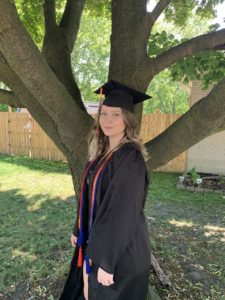The effects of the pandemic are straining young adults
Ever since being sent home from school in March 2020, many young adults say they are struggling with transitioning from high school to post-secondary education.
Students who had to finish their last year of high school online said they find they have lost more than a few months of school – they are missing the most crucial transition of their lives.
“People who didn’t go through this can look back at their last days of high school and think, ‘That was really nice,’” said Alyssa Weisener, a first-year Interdisciplinary Arts and Science student at the University of Windsor. “And I look back and think, ‘Oh, I spent my days in my room.’”
Like many others, 18-year-old Weisener did not get to attend her high school graduation or prom. She could not get the full university experience due to the pandemic. However, she was able to have a small drive by and a virtual graduation arranged by her school.
Director of Student Services at St. Clair College, Art Barron, said young adults are currently missing this vital transition and many students are trying to seek closure.
Barron said some students are coping well with the loss of important events. Prom or graduation can be stressful for students with social anxiety. He also said more extroverted people would be struggling because they cannot connect with their peers for support.
Like Weisener, Emma Crooker, a first-year Communication, Media and Film major at the University of Windsor, was not able to attend her graduation or prom but celebrated her graduation in a similar setting.
Being in the same routine every day has become increasingly hard, said 18-year-old Crooker.
“It’s hard just waking up, doing school work and going to bed then doing the same thing,” Crooker said. “I definitely have more social anxiety now because I’m not used to being around people anymore, and I get stressed out much easier than before.”
Barron said they knew about mental health issues on campus in previous years, but now they do not hear much about it. He also said there is less interaction with students and counselors due to fewer physical opportunities.
Weisener said she feels the social interaction she is receiving right now is not enough. She would like to engage with others and do volunteer work, but cannot due to current circumstances.
“Humans need socialization, and without that socialization, it’s difficult,” said Weisener. “Because of the pandemic, you learn to be alone, so I feel going back to how things were before will be very different.”
Young adults are also experiencing significant disadvantages regarding the quality of their education.
A study by The National Center for Biotechnology Information shows since school closures started during the pandemic, 91 per cent of the world’s student population have been negatively impacted. Experts say without a properly structured school setting, students can experience a disruption in routine, boredom and lack of creative ideas.
“I feel that I am definitely at a disadvantage in trying to make connections for my program,” Crooker said. “You want to get to know the profs and the TAs so that you can become an intern on a film set, so you can have one foot in the door, but I have met zero people.”
Crooker also said she feels her degree will be worth nothing by the time she graduates because she has no field experience and has not touched a camera, which is vital for the program.
Barron also shared some healthy stress relief practices.
“Find balance, exercise and make healthy choices,” said Barron.
He also said help is there for those who need it. Services for St. Clair College can be accessed at https://www.stclaircollege.ca/student-services/mental-health.

Emma Crooker posing on her front lawn dressed in her cap, gown and coloured cords for graduation on June 16, 2020. (Photo by Emma Crooker).


